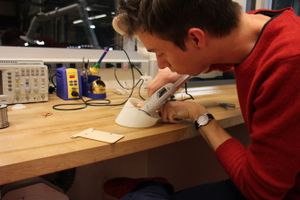Designer Andrew Maxwell-Parish was trained as an engineer, but has followed his curiosity into a diverse range of projects, for his own leisure and for several years as a teacher at the California College of the Arts (CCA).
“I always need to be learning,” he says. “As soon as I start feeling stagnant with my learning, I get restless.” Now that restlessness has taken him into a new adventure as an independent teacher of design in the area of rural Minnesota where he grew up.
Learning Design by Doing It
When he was an undergraduate, Maxwell-Parish grew frustrated because his mechanical engineering courses did not actually call for building anything tangible. So he taught himself programming and electronics through hands-on projects.
“Many of my projects resulted from just blindly starting to play around with something new in order to better understand it,” he says. “I’m not the type of person who will learn from doing lessons from a textbook, but through this blind exploration into the unknown.” From 2012 until earlier this year, he fostered that same hands-on approach at the CCA Hybrid Lab, which gives students a “welcoming environment” for the kinds of interactive projects that inspire Maxwell-Parish.
During that time, he was also an Artist in Residence at Autodesk’s Pier 9 workshop, where he created playful and practical designs including the High Five Camera, the Wu-Tang Can interactive tip jar, and a system for controlling a 3D printer with hand gestures.
Hitting the Road to Design and Teach
Although Maxwell-Parish loved his role at CCA and says he learned an enormous amount there, in 2015 he decided to take a new tack in his career. He and his partner left the Bay Area to return to the small family farm in Minnesota where he grew up. They now live on a 1987 diesel school bus that Maxwell-Parish has converted into a fabrication studio that runs off of solar power.
This summer, Maxwell-Parish began to use the bus as a mobile classroom for “workshops on technology development such as Arduino, 3D printing, solid modeling, and CNC milling.” For his 3D printing and CNC workshops, he’s using Fusion 360, which he began using in it’s beta version while at Pier 9. “It’s really a Swiss Army [knife] software,” he says, and he appreciates that “it is made freely available to many individuals, which works out well for my frugal ways.”
Education in Design for Everyone
Maxwell-Parish loves teaching, and leading workshops for non-technical students in rural areas particularly reflects his values. “I feel that knowledge and access to knowledge is a right that should be given to all people,” he says. In line with that idea, he believes that it’s important for teachers to find methods and analogies that make previously impenetrable technical ideas accessible “to all people of all backgrounds.”
“I like to take difficult concepts and make them playful,” he adds. “Playful concepts are inviting. Serious concepts are intimidating.”
The workshops also reflect his interest in community-based technology development: “As a community, how do we generate solutions for localized problems?” He wants his workshops to teach people to manipulate technology so that they can “move from feeling reliant upon technology to becoming more self-reliant through technology.” At a minimum, he believes that farmers of the future will benefit from knowing how to do solid modeling so that they can fabricate their own parts and repair equipment.
Wherever he decides to go next, Maxwell-Parish is sure to rely on his skills, his passion, and his fascination with that “blind exploration into the unknown” as a teacher and practitioner of design.


